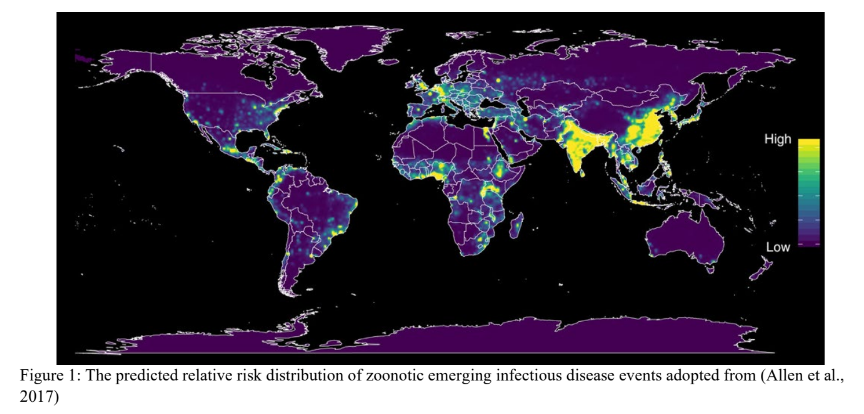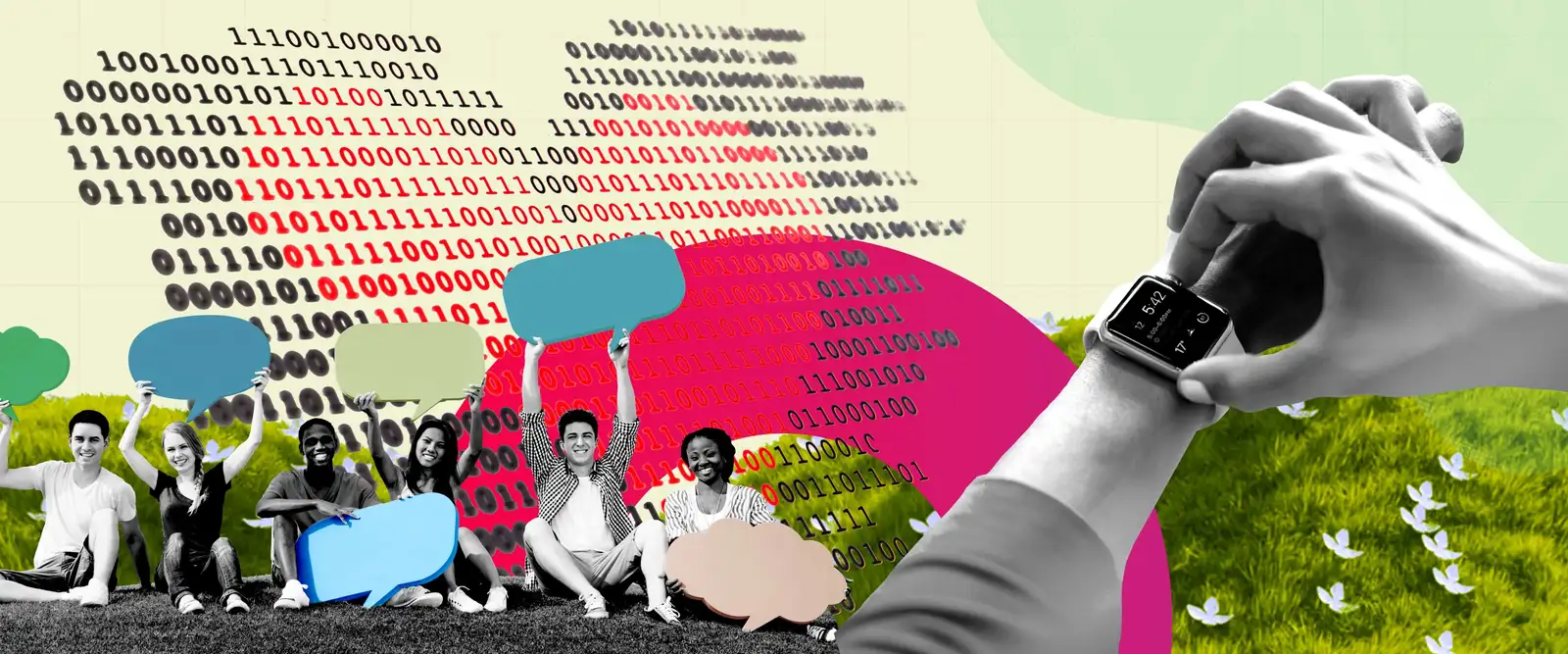This essay is part of a special collection of youth authored essays written by DTH-Lab’s Regional Youth Champions (2023-2024). The full collection of essays can be found here in the partnering document of the global interim report on Building a blueprint for digital first health systems: Findings from global youth consultations.
In the changing world of global health, health security threats persist even for the most advanced healthcare systems. Southeast Asia in particular, a region with rapid population growth and dense human-animal coexistence, faces continual risks from outbreaks and public health emergencies related to emerging infectious diseases (EID), natural hazards and unsafe food and water (World Health Organization, 2017). The majority of EIDs originate in animals and the risk of these pathogens spilling over from animals to humans is predicted to be highest in tropical regions including Southeast Asia as illustrated in Figure 1 (Allen et al., 2017). Recognizing the need to prevent these emerging diseases and potential pandemics becomes paramount in the context of the Southeast Asia region’s growth.

In the face of global health crises like the COVID-19 pandemic, traditional healthcare systems have been put to the test, highlighting both strengths and weaknesses. The pandemic has emphasized the necessity for a more dynamic and transformative healthcare system, making it imperative to explore innovative approaches that empower communities to actively participate in pandemic preparedness.
As health systems increasingly shift towards a digital first paradigm, there is a unique opportunity to strengthen these systems and make future approaches more inclusive. The integration of digital technologies not only facilitates the efficient delivery of healthcare services but also opens avenues for citizen engagement and empowerment in unprecedented ways. This transformative shift towards digital health systems offers a promising avenue for creating more resilient and responsive healthcare infrastructures. In this context, one innovative approach that holds great potential is the integration of a digital first health system with the principles of citizen science. By harnessing the power of digital platforms, mobile applications and data analytics, citizens can actively contribute to disease monitoring, contact tracing and the dissemination of vital health information. This participatory model not only enhances the speed and accuracy of data collection but also fosters a sense of community responsibility and involvement in public health initiatives.
Citizen science involves the active involvement of ordinary people in scientific research. Integrating citizen science into healthcare not only democratises the research process but also taps into the collective intelligence of diverse communities. Engaging citizens as contributors rather than passive recipients of healthcare services encourages a sense of ownership and fosters a culture of shared responsibility for public health outcomes. (Varga et al., 2023)
This combination approach addresses not only infectious diseases but also One Health challenges posed by zoonotic diseases, climate effects, antibiotic resistance, food safety, food security and many more. A digital first health system utilises technology to enhance accessibility, communication and data-driven decision-making. This approach goes beyond geographical boundaries, facilitating a uniform exchange of information among healthcare providers, policymakers and citizens. It positions communities as equal contributors to the preservation of public health.
In terms of tackling emerging infectious diseases, a digital first health system provides a platform for early detection. Imagine this: a farmer in a remote village notices something off about his livestock and with a few taps on his phone, he reports it to health authorities and informs his neighbouring farms. Early detection of unusual cases is a critical component of a surveillance system and this is a good example of the power of a connected community. By intertwining citizen science, where locals actively participate in disease surveillance, we create a dynamic defence against outbreaks before they hit the headlines.

Fundamental to this approach is data transparency, building trust between communities and healthcare authorities. Transparent data sharing facilitates informed decision-making, empowering communities to proactively mitigate pandemic impacts. It strengthens the feedback loop between citizens and health professionals, fostering a continuous learning environment.
However, challenges exist. Privacy concerns, data equity, digital literacy gap and ensuring equal access to technology must be addressed collaboratively by governments, healthcare organizations and technology developers. Overcoming these hurdles is essential for creating an inclusive and equitable digital first health system.
In conclusion, empowering communities through a digital first health system and citizen science transforms pandemic preparedness. By harnessing technology and community engagement, we can establish a resilient health system in the context of pandemic preparedness. Acknowledging the collective responsibility for community health is imperative as we contemplate the future of healthcare.
Soe Yu Naing is a global health professional with more than ten years of experience in project management and scientific research.

© 2025 DTH-Lab. All Rights Reserved.
Digital ethics | Citizen Science | Digital health innovations
Soe Yu Naing is a global health professional with more than ten years of experience in project management and scientific research. He received an international MSc in Infectious Diseases and One Health (IDOH) from the Université de Tours (France), the Universitat Autònoma de Barcelona (Spain), and the University of Edinburgh (United Kingdom). He is a product of liberal arts education and has a bachelor’s degree in Neuroscience from Earlham College in the United States. Later, he joined the University of Pennsylvania to work on research toward HIV cure. Currently, he is a researcher at Utrecht University in the Netherlands. His work mainly focuses on molecular epidemiology of emerging infectious diseases and antimicrobial resistance. He is currently managing a transdisciplinary project titled “”Impact of reducing colistin use on colistin resistance in humans and poultry”” in Indonesia. Beyond academia, Soe Yu Naing collaborates with ISGLOBAL, OHT, and consults for WHO, contributing to global health policy. He also serves as a visiting faculty at Parami University in Myanmar, teaching research methods, infectious diseases, and One Health. In his leisure, he writes Burmese short stories and podcast scripts, tackling taboo subjects like sexual and reproductive health (SRH) to foster open discussions in Myanmar.